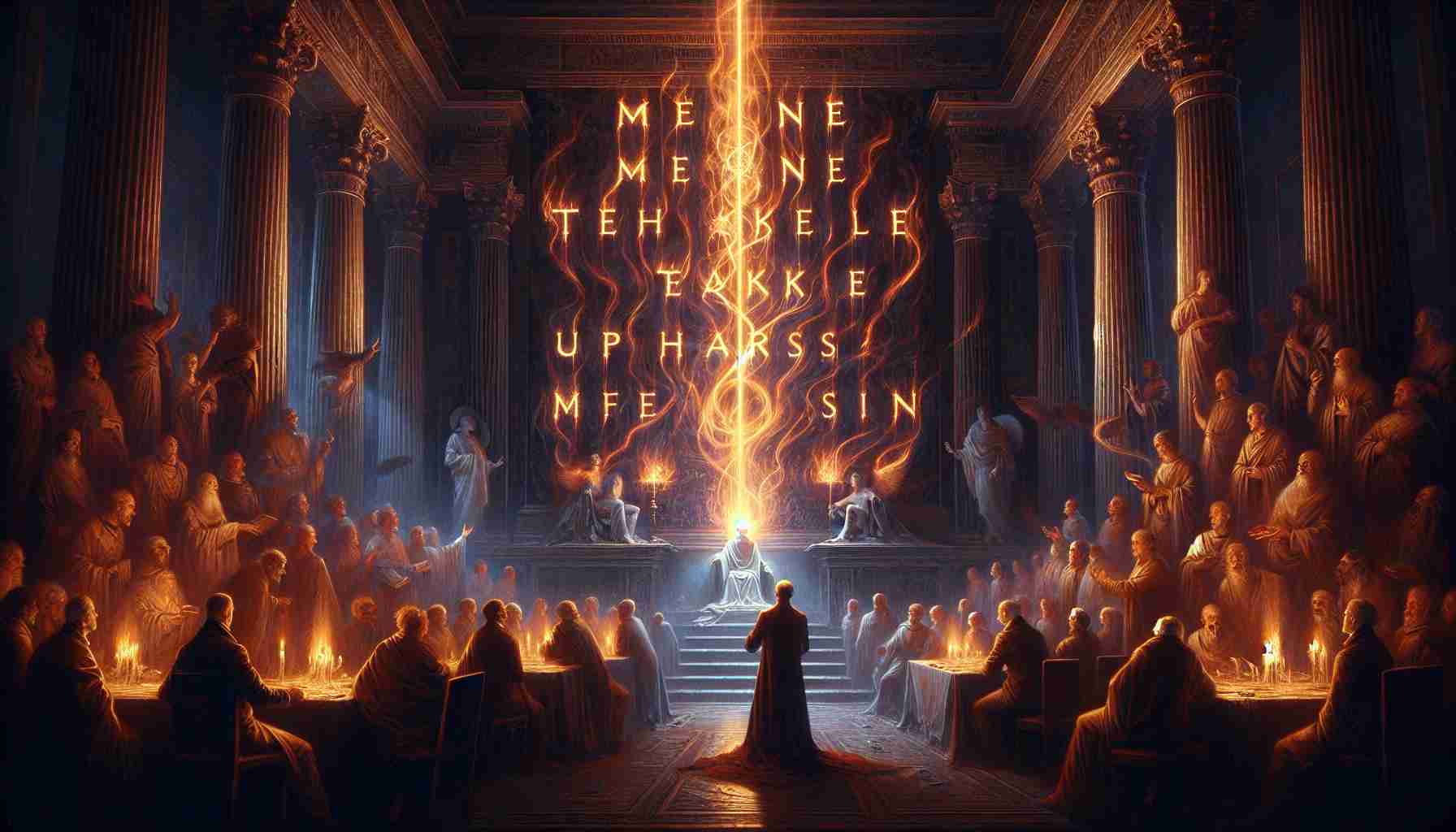

My name is Nadab. I was a servant in the king’s court, charged with pouring wine and keeping the vessels polished. I was not born a Babylonian. My people came from Judah, dragged here as captives when I was still a boy. I used to stare at the temple cups taken from Jerusalem and wonder how long God would stay silent.
Belshazzar was nothing like his father. He laughed louder and feared less. He didn’t conquer—he played games with power. That night, the king held a feast, a wild one, even by palace standards. Over a thousand nobles, gold spilling from every table, drunken women spilling from every room. Then he ordered the vessels of Yahweh brought in—those we’d carried from our ruined temple. He would drink wine from the holy cups.
I wanted to say something. But I didn’t. I only bowed, hands shaking as I brought my Lord’s vessels to drunken men.
When the king lifted the cup to his lips, the laughter got louder. I turned my eyes away. It felt like my own guilt was being poured across the floor. I had polished those vessels, not with water, but with silence.
Then it happened.
A hand—no body, just a hand—appeared by the lampstand, writing on the plaster wall. The room froze. Every eye stared. The king’s face turned white. His knees knocked so hard I could hear it. I remember gripping the table's edge with both hands to stay standing.
No one could read the writing. Not the magicians. Not the soothsayers. The letters were sharp, burned into the wall like fire. I thought of the songs my mother used to hum—songs about God writing His Word, His law. I hadn't sung those songs in years.
Someone called for Daniel—I'd heard of him. He’d once stood tall when others bowed. I stood at the edge of the crowd as he read the words. MENE, MENE, TEKEL, PARSIN. Daniel’s voice was calm, but you could feel judgment in the air. He said the king had been weighed and found wanting. That his kingdom would fall—tonight.
The king tried to reward him. Gave him a robe and chain. But Daniel wore the truth like a better crown.
That same night, the walls fell. The Persians came. The king died. All his gold and laughter couldn’t save him.
But I lived.
I don’t know why. I wasn’t brave. I didn’t defend the sacred. I only stood there, scared and silent. Yet I lived.
Years have passed now. I no longer serve kings.
Every time I clean a cup, I remember that night. The hand on the wall. The weight of holiness. I whisper prayers when no one’s listening, partly for mercy, partly for courage.
Maybe next time, I’ll speak.
My name is Nadab. I was a servant in the king’s court, charged with pouring wine and keeping the vessels polished. I was not born a Babylonian. My people came from Judah, dragged here as captives when I was still a boy. I used to stare at the temple cups taken from Jerusalem and wonder how long God would stay silent.
Belshazzar was nothing like his father. He laughed louder and feared less. He didn’t conquer—he played games with power. That night, the king held a feast, a wild one, even by palace standards. Over a thousand nobles, gold spilling from every table, drunken women spilling from every room. Then he ordered the vessels of Yahweh brought in—those we’d carried from our ruined temple. He would drink wine from the holy cups.
I wanted to say something. But I didn’t. I only bowed, hands shaking as I brought my Lord’s vessels to drunken men.
When the king lifted the cup to his lips, the laughter got louder. I turned my eyes away. It felt like my own guilt was being poured across the floor. I had polished those vessels, not with water, but with silence.
Then it happened.
A hand—no body, just a hand—appeared by the lampstand, writing on the plaster wall. The room froze. Every eye stared. The king’s face turned white. His knees knocked so hard I could hear it. I remember gripping the table's edge with both hands to stay standing.
No one could read the writing. Not the magicians. Not the soothsayers. The letters were sharp, burned into the wall like fire. I thought of the songs my mother used to hum—songs about God writing His Word, His law. I hadn't sung those songs in years.
Someone called for Daniel—I'd heard of him. He’d once stood tall when others bowed. I stood at the edge of the crowd as he read the words. MENE, MENE, TEKEL, PARSIN. Daniel’s voice was calm, but you could feel judgment in the air. He said the king had been weighed and found wanting. That his kingdom would fall—tonight.
The king tried to reward him. Gave him a robe and chain. But Daniel wore the truth like a better crown.
That same night, the walls fell. The Persians came. The king died. All his gold and laughter couldn’t save him.
But I lived.
I don’t know why. I wasn’t brave. I didn’t defend the sacred. I only stood there, scared and silent. Yet I lived.
Years have passed now. I no longer serve kings.
Every time I clean a cup, I remember that night. The hand on the wall. The weight of holiness. I whisper prayers when no one’s listening, partly for mercy, partly for courage.
Maybe next time, I’ll speak.